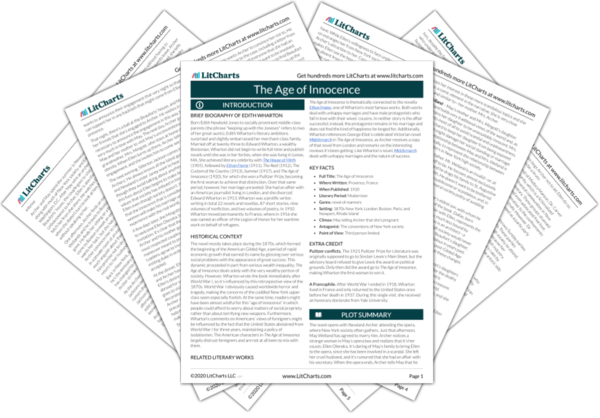Innocence vs. Experience
As suggested by its title, The Age of Innocence focuses on New York society’s stubborn insistence on a blinding and damaging pretension of innocence. In many ways, this performance stems from society’s avoidance of scandal at all costs, and it often amounts to characters pretending that they don’t understand things that they actually understand completely.
In particular, New York society insists that women remain innocent and pure. Women have long been valued for purity and…
read analysis of Innocence vs. ExperienceThe Failure of Marriage
Marriage is the central institution of New York society. It is considered to be a commercial and social bond that ensures the continuation of prominent families and their fortunes, rather than a personal arrangement that can realistically bring happiness and fulfillment to a couple. Wharton’s depiction of marriage as a flawed institution that can cause misery and ruin lives is tragic in light of how much power the institution of marriage has over the lives…
read analysis of The Failure of MarriageThe Rules of Society
In this novel, New York high society is governed by a vast array of social rules that dictate almost every aspect of its members’ lives. These rules almost always go unspoken, and generally, the need to actually spell them out means that someone has shamefully transgressed them (as Ellen Olenska does). New York society wants, above all, to avoid scandal and the headache that goes along with it, and these rules aim to safeguard all…
read analysis of The Rules of Society
American vs. Foreign
Although Edith Wharton was American, she spent the majority of her last twenty-four years living in France, and The Age of Innocence presents a strong critique of the way Americans thought of Europeans prior to World War I. The New Yorkers in this book are generally quite suspicious of Europeans, who embody American fears about loose morals and cultural decadence. Americans think it’s a shame when their own people marry foreigners, they’re quick to judge…
read analysis of American vs. ForeignChange and Progress
As Wharton is writing about a period approximately fifty years before her own time, her retrospective view of the 1870s lays bare all of the changes that have come about since then—even the very title, The Age of Innocence, suggests that the story takes place during a definable period that’s now over. This sense of change over time is magnified by the central conflict of the novel: Archer and Ellen chafing against the social…
read analysis of Change and Progress






